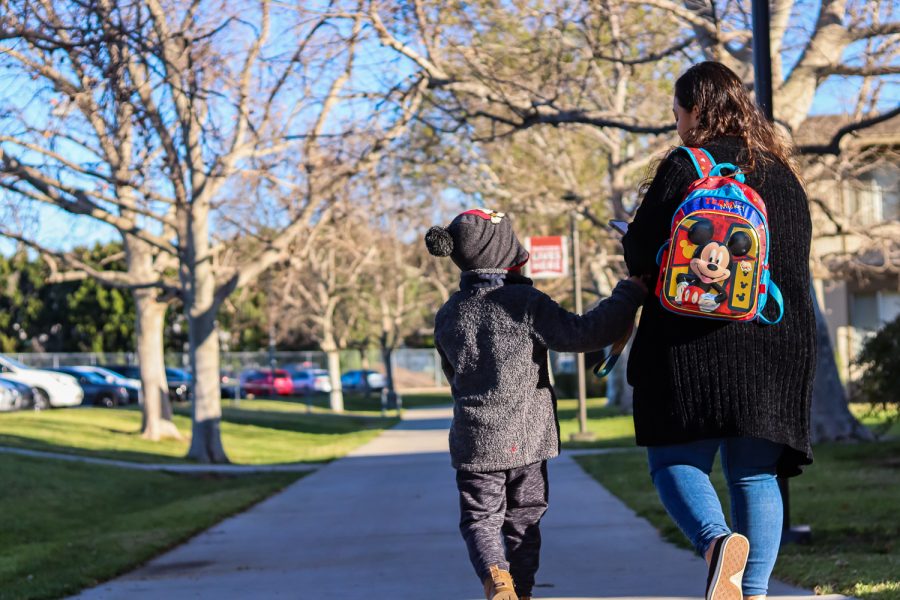A first-generation student-parent overcomes family trauma
December 23, 2022
A line of cars exiting El Camino Real High School in Woodland Hills wraps around the sidewalk as Kelly Chavez pulls up to pick up her daughter Alexa Chavez after a full day of nonstop hustling that began around 6 a.m.
Chavez is a 33-year-old first-generation sociology major at CSUN.
Alexa shared stories of her mother helping others in her classes, her empathy toward people and animals, and the lessons she learned from her, such as valuing her mental health and respecting her own boundaries.
“I’m not going to give anyone the chance to hurt me now. I also have that mindset thanks to my mom,” Alexa said.
The work Chavez put into building this relationship with her daughter is clear. Intimacy with family was not something that came naturally for Chavez. This was something she had to learn for herself.
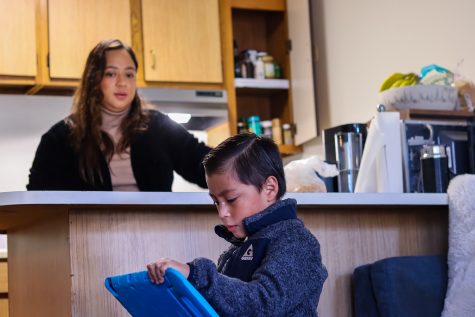
A faint white scar on Chavez’s wrist is a reminder of how far she has come since taking control of her destiny.
Chavez was born and raised in El Salvador. She describes her hometown as a place of heavy religious influence.
“Nobody there believes in taking care of yourself mentally, if you feel panic attacks, intrusive thoughts, it’s a demon,” Chavez said. “Something evil and you have to go to church, you have to pray to the holy spirit, you’re gonna heal and if you don’t heal then you need an exorcism. That was my family. I definitely think it is happening a lot — it is a common denominator with other families that I know.”
Chavez met her husband when they were 13 and 15 years old, respectively, and had Alexa with him when she was 17.
At the time, Chavez was couch-hopping with her mom and sister. When she was a child, tragedy struck her family.
“It was bad for my mom. My dad was murdered by his best friend, my mom was homeless after that. My family from my dad’s side didn’t help her, so she went to live with [her aunt],” Chavez stated. “She had a husband but he was the worst.”
Chavez explained what she and her sister faced while living with her aunt and uncle.
“Back in El Salvador during the civil war, he was in the military. He was not a nice person,” Chavez recalled. “My mom got out of the house, and then she went to live with my dad’s family. They did not accept her.”
Chavez’s mother needed a safe place to bring her daughters, away from predatory family members.
“He was about to rape me, but thank God my mom got out. I was very young, I was a baby. It’s terrible,” Chavez said.
Chavez’s teacher, Daniel Olmos, who has a doctorate in sociology, spoke of her experience.
“The patterns of migration from El Salvador are typically structured by push factors than, for example, our like war, civil war, you have, you know, familiar or domestic intimate violence you have in this contemporary moment, you have a lot of gang violence and cartel violence. The push factors are really significant … There’s a lot of different variables that go into play that actually structure the socialization process and social relations in general in a place like El Salvador,” Olmos said. “Kelly represents those folks who decided as a family to leave that context and come to the United States. She’s a unique individual. Although she does represent a good portion of our student body, the first-generation immigrants.”
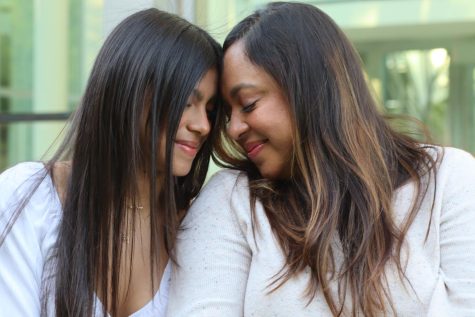
After leaving those living conditions, Chavez’s grandmother became the nurturing figure in her life.
“My sister had the hard part because I had my grandma,” she said. “My grandma was so loving. She gives me love when nobody wants to love me.”
Her father’s mother was the one person who believed in her and was her motivation. Her grandmother’s love was a driving factor that kept Chavez going even when life weighed on her.
“She was an angel,” she began. Her father’s mom, her grandmother, was the person who provided motivation to Chavez’s life.
In 2011, the two got married. Their love did not go unscathed, it took a lot of work and communication as the two learned to grow into their own and grow together. The couple faced challenges as they did not always share the same worldviews. They separated for five years.
“With us between me and him, he’s been good. It was challenging. It was challenging because I’m very conservative and my husband was more liberal and that would create confrontation,” Chavez said. “We are in a good place now but in the beginning it was tough.”
She talks about the difficulties of being a teenage husband and wife.
“I think my daughter, … we always tried to make a good life for her but you can see we have a good outcome with her but it was still fighting and that’s damaging for a kid at any age, but we love each other so much,” Chavez said. “We’ve been working on it, it hasn’t been easy. We want to be together and we love each other and I think my kids feel the love and they are happy they want to be with us. My daughter likes to be with us and she’s a teenager!”
She described how Alexa will still cuddle and show her affection regularly.
“We must be doing something good since she wants to be with us,” Chavez said.
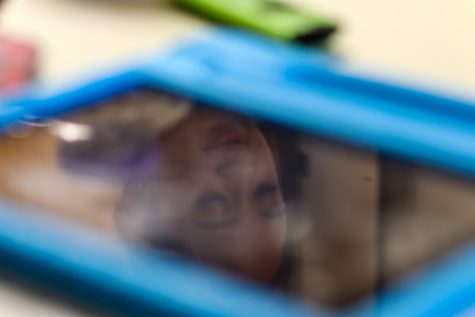
From an early age, Chavez had seen the cruelty of life, not only in her own but in the lives of those around her. She watched the people she loved most whither away under the pressure and lack of support they received in the social climate of El Salvador. As she works toward graduating, she expressed her goals after she receives her degree.
“I would want to work in a high school and help teenagers because I struggled so much being pregnant. I lost so much. I lost my cousin … She was 15 and I was 21. The year I married she passed away. She was one twin, we were close. She would tell me, ‘Kelly, you always talk to me.’ We come from a family that would say, ‘Why are you crying? Don’t be stupid. You’re dumb.’ She used to cry — her mom was in [America while] she was in El Salvador,” Chavez explained.
The 17-year-old tried to take care of her daughter but would constantly be told she did not know what to do. Chavez’s mother and sister would often take over. This put a wedge between her and her daughter from the beginning, leaving Kelly feeling like she could not do what she needed to for Alexa.
“They don’t let me and would always say, ‘You didn’t raise her, I raised her.’ I was there, I was breastfeeding her and then I left. I left, and my resident card was ready. My husband and daughter could not come. That was 2009 before she was 3 years old. She was 2 1/2 years old. I didn’t raise her, my sister raised her because she took care of her for five years.”
Alexa came to America when she was 7. Kelly had to rebuild the relationship with her daughter.
“I didn’t feel connected. [Alexa] was sad, she thought my sister was her mom,” Chavez said.
Young Alexa and her mother did not know what to do with each other after the five-year separation.
“We don’t know what to do with each other. I don’t know how to raise you, what you like, you’re different from when I left, what can I do? It’s just sad but at some point I gave up, I have to change because I can’t keep doing this anymore,” Chavez said.
“I felt detached from her. I didn’t feel the bonding — it’s sad, you don’t realize it because you’re so young but when you are mature enough and thinking back, you think, ‘Why did I let this happen?’” Chavez explained.
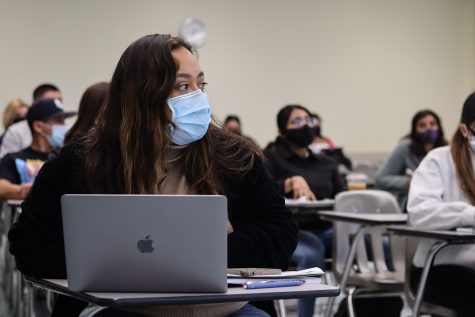
After a couples retreat, Chavez listened to another mother share her experience with her child; it mirrored the relationship she had with Alexa at the time. This was a turning point for her. She knew she had to do better for her daughter.
“She was always looking for me. I tried to be better,” Kelly said.
The young mother wanted to be better than her mom. She described how her mother hit her growing up.
“I wanted to be better than my mother for her,” she said.
This environment made it hard for Chavez to show physical affection in the beginning with her daughter. She described her daughter reaching out for an embrace, but Chavez found it difficult as she had not yet dealt with that level of intimacy.
“I feel so bad about it, I can talk about it now, it’s just the worst thing. I cried and I prayed. I didn’t want to do that, she’s my daughter and I thank God I do better. I’m not a religious person, but my family was Catholic,” she said.
Chavez has worked on building a relationship with Alexa every day since. Alexa described how much her mother values her mental health and well-being. She speaks with high respect for her, and Kelly sees how the results from work toward healing herself has affected her family.
“I’m so lucky, I now have the best family,” Chavez smiled, thinking back to the place she once was to where she is now, with her family dynamic.
“I’m more conscious of what I say and how I act, maybe that is why we have the best relationship you can have with a daughter,” Chavez noted.
Kelly dropped out of school to care for her daughter, which ate at her mind.
“I dropped [out of] school. That was something that hit me so hard, I was not able to go to school because I was pregnant. I don’t know why I was always dreaming about it,” Chavez recalled. “Frustration. Dreaming that I can’t go to school, I missed it. Why I’m so dumb?”
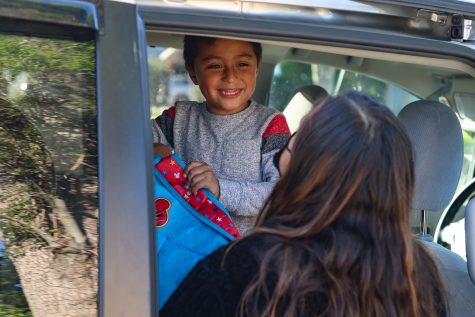
The thoughts of self-doubt were amplified by the external voices of her family around her. Family members would tell her she would never amount to anything, that being a mother was her only purpose in life now. These voices turned into Chavez’s own thoughts that she still fights off today.
She battles the voices telling her she is not good enough to achieve more, learning to separate her own words from those who told her she could not. Their words ring through her ears, disguising themselves as what Chavez described as intrusive thoughts.
“I think I have to realize I have intrusive thoughts … I have to choose either to cry about it or do something about it. I know I had a hard life, I know my English is not the best, I know I did not have extracurricular classes when I was young, no money, no resources, but that doesn’t mean I cannot go further,” she said. “I can do that — one day I will be graduating and they will look at me working in a good place, not only as a nanny. I don’t see myself doing this forever.”
She knew she needed to make more for herself. In 2009 when she turned 19, Chavez came to America. During the five years before her husband and daughter could come over, she was alone for the first time in her life. For the first time, Chavez could be alone with her thoughts.
“When I moved here, I felt it. When I was living with my mom, I was always busy with my sister. We were a family of six in a single-bedroom apartment … I had a full-time job … I came here and I was alone, my thoughts came … I was missing them but they didn’t want anything to do with me,” Chavez said as she looked down at her meal.
When Chavez came to America she got a job as a nanny working for wealthy families in the area, while earning her high school diploma through the Los Angeles Public Library.
“I tried to apply for school, I was looking for chances like online high school but they had a lot of requirements so I had to go to in-person classes first. I was thinking, ‘I wish I could have the chance to go to school as an online learning thing.’ I found through the L.A. Public Library they have these amazing opportunities where you graduate from high school through a private online program and they pay for it. It was nice, even people who were in jail could do it,” she explained.
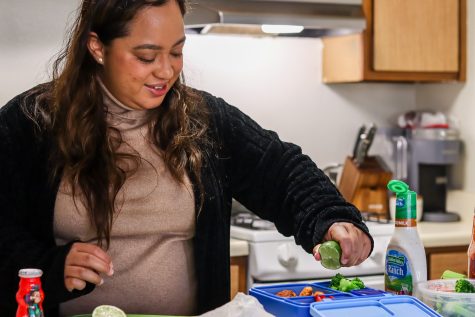
In the beginning, Chavez wanted to go to school to prove to her family she was worth more than they believed her to be. As time passed, she realized getting her degree went beyond proving a point. She was doing this for herself and opening a new path for her children and the family to come long after her.
“You feel a big responsibility … I didn’t know until I went to Pierce what a first-generation student was … I feel an obligation to do my best, it’s a big responsibility,” she said. “When I think of my children and my grandchildren, wow that’s going to be a huge difference because I’m the one who is opening the way … I’m making the path for them because my family never considered higher education, they think they couldn’t afford it — we always think that it was impossible, we grew up thinking these opportunities are only for people who had a mom or dad who did before them … I grew up listening to that because my dad passed away and my mom had nothing. I would not have the opportunities that my cousins with a mom and dad had with a good income, something I would never think I could have. They told me this was impossible for me.”
Chavez described a future for herself and her family, motivated by the thought of helping people like herself who are going through similar situations and need extra support. She continues to work through getting her degree in sociology.
Chavez talked about using her degree to help others just as she did for her family. Despite their former relationship, she still supports her mother by buying her groceries regularly.
Chavez even paid to put her sister through makeup school in El Salvador.
After losing so many important people in her life, Kelly values kindness and compassion above all else. She has attempted suicide twice.
“That is why I want to help people. If you ask me what my biggest goal is … [it would be to] open something in El Salvador to help people like me — just be free for anyone to have a therapist, anyone who wants to talk and be open,” Chavez said. “Nobody believes in that and there are kids who need it. They have parents who are abusive, they are neglecting them. In El Salvador, this is how you fix something. Hitting kids. Telling them the worst things and that’s the way they were raised over there. Hitting, hitting to say bad stuff.”
“Not having a place to go, nobody understands you,” Chavez continued. “I wished to say something, but nobody wants to listen to you. Everybody is thinking you have to be a good kid, you have to be a good son, you have to be a good daughter. They do it because they ‘love’ you. How are you going to love someone and beat them every day? I forgive my mom because she was raised like that and I understand that. If you asked me at 15, I hated her.”
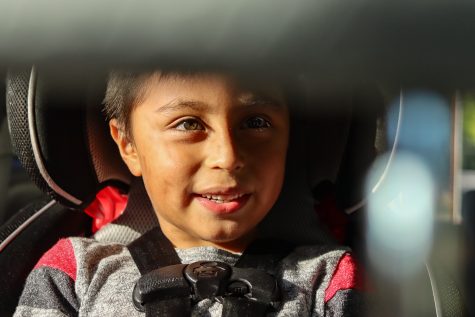
For Chavez and her husband, they strive to keep their children safe from being in the situations they faced growing up.
“It plays a big role because I want to protect them so bad. I don’t trust anybody … My husband and I had kind of the same background. He was alone all the time, people tried to do bad stuff to him, it’s kind of the same background. We are so protective of our kids,” Chavez said, expressing how it is good but also a setback that both she and her husband have no trust of others with themselves and their children.
In 2015 Chavez gave birth to her son Emanuel, who she named after her late father. After rebuilding her relationship with Alexa, her parenting style had become something she was more prepared for with him.
Chavez juggles her routine as both a student and a parent. Cooking meals for her picky eater and driving him to and from school while still making time for her own work and classes.
After a full day on the go, Chavez slows down when she takes moments to eat. She cooks traditional Salvadoran dishes and various other things for her family. They do not always get to eat together, but this is always a top priority during Chavez’s busy day.
Her efforts do not go unnoticed.
“I admire my mom for pushing through … She hasn’t given up. It takes courage to still be at her age and take advantage of her opportunities. It is so cute,” Alexa continued as she recalled everything her mother has done for her and her brother.
